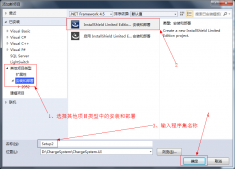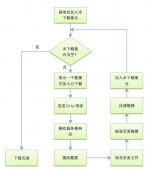看到这个题目,是不是很眼熟?在博客园里搜下,保证会发现关于这个东东的文章实在是太多了~~~真得是没有写得必要,而且我也有点懒得去琢磨字句。(看到这,肯定得来个转折的了,不然就看不到下文了,不是吗)但是,为了自己下一篇要写的文章做参考,还是有必要先补充一下socket基础知识。
注意:如果你已经接触过socket,那就没什么必要耽误时间看下去了。另外,如果发现其中任何错误,欢迎直接指出。
1.按惯例先来介绍下socket
windows中的很多东西都是从unix领域借鉴过来的,socket也是一样。在unix中,socket代表了一种文件描述符(在unix中一切都是以文件为单位),而这里这个描述符则是用于描述网络访问的。什么意思呢?就是程序员可以通过socket来发送和接收网络上的数据。你也可以理解成是一个api。有了它,你就不用直接去操作网卡了,而是通过这个接口,这样就省了很多复杂的操作。
在c#中,ms为我们提供了 system.net.sockets 命名空间,里面包含了socket类。
2.有了socket,那就可以用它来访问网络了
不过你不要高兴得太早,要想访问网络,还得有些基本的条件(和编程无关的我就不提了):a. 要确定本机的ip和端口,socket只有与某一ip和端口绑定,才能发挥强大的威力。b. 得有协议吧(否则谁认得你这发送到网络的是什么呀)。想要复杂的,我们可以自己来定协议。但是这个就不在这篇里提了,我这里介绍两种大家最熟悉不过的协议:tcp & udp。(别说你不知道,不然...不然...我不告诉你)
如果具备了基本的条件,就可以开始用它们访问网络了。来看看步骤吧:
a. 建立一个套接字
b. 绑定本机的ip和端口
c. 如果是tcp,因为是面向连接的,所以要利用listeno()方法来监听网络上是否有人给自己发东西;如果是udp,因为是无连接的,所以来者不拒。
d. tcp情况下,如果监听到一个连接,就可以使用accept来接收这个连接,然后就可以利用send/receive来执行操作了。而udp,则不需要accept, 直接使用sendto/receivefrom来执行操作。(看清楚哦,和tcp的执行方法有区别,因为udp不需要建立连接,所以在发送前并不知道对方的ip和端口,因此需要指定一个发送的节点才能进行正常的发送和接收)
e. 如果你不想继续发送和接收了,就不要浪费资源了。能close的就close吧。
如果看了上面文字,你还不清楚的话,就来看看图好了:

面向连接的套接字系统调用时序

无连接的套接字系统调用时序
3.开始动手敲~~代码(简单的代码)
首先我们来写个面向连接的
tcpserver
|
1
2
3
4
5
6
7
8
9
10
11
12
13
14
15
16
17
18
19
20
21
22
23
24
25
26
27
28
29
30
31
32
33
34
35
36
37
38
39
40
41
42
43
44
45
46
47
48
49
50
51
|
using system;using system.net;using system.net.sockets;using system.text;namespace tcpserver { /// <summary> /// class1 的摘要说明。 /// </summary> class server { /// <summary> /// 应用程序的主入口点。 /// </summary> [stathread] static void main(string[] args) { // // todo: 在此处添加代码以启动应用程序 // int recv;//用于表示客户端发送的信息长度 byte[] data=new byte[1024];//用于缓存客户端所发送的信息,通过socket传递的信息必须为字节数组 ipendpoint ipep=new ipendpoint(ipaddress.any,9050);//本机预使用的ip和端口 socket newsock=new socket(addressfamily.internetwork,sockettype.stream,protocoltype.tcp); newsock.bind(ipep);//绑定 newsock.listen(10);//监听 console.writeline("waiting for a client"); socket client=newsock.accept();//当有可用的客户端连接尝试时执行,并返回一个新的socket,用于与客户端之间的通信 ipendpoint clientip=(ipendpoint)client.remoteendpoint; console.writeline("connect with client:"+clientip.address+" at port:"+clientip.port); string welcome="welcome here!"; data=encoding.ascii.getbytes(welcome); client.send(data,data.length,socketflags.none);//发送信息 while(true) {//用死循环来不断的从客户端获取信息 data=new byte[1024]; recv=client.receive(data); console.writeline("recv="+recv); if (recv==0)//当信息长度为0,说明客户端连接断开 break; console.writeline(encoding.ascii.getstring(data,0,recv)); client.send(data,recv,socketflags.none); } console.writeline("disconnected from"+clientip.address); client.close(); newsock.close(); } } } |
tcpclient
|
1
2
3
4
5
6
7
8
9
10
11
12
13
14
15
16
17
18
19
20
21
22
23
24
25
26
27
28
29
30
31
32
33
34
35
36
37
38
39
40
41
42
43
44
45
46
47
48
49
50
51
52
53
54
55
56
57
58
59
60
61
|
using system;using system.net;using system.net.sockets;using system.text;namespace tcpclient { /// <summary> /// class1 的摘要说明。 /// </summary> class client { /// <summary> /// 应用程序的主入口点。 /// </summary> [stathread] static void main(string[] args) { // // todo: 在此处添加代码以启动应用程序 // byte[] data=new byte[1024]; socket newclient=new socket(addressfamily.internetwork,sockettype.stream,protocoltype.tcp); console.write("please input the server ip:"); string ipadd=console.readline(); console.writeline(); console.write("please input the server port:"); int port=convert.toint32(console.readline()); ipendpoint ie=new ipendpoint(ipaddress.parse(ipadd),port);//服务器的ip和端口 try { //因为客户端只是用来向特定的服务器发送信息,所以不需要绑定本机的ip和端口。不需要监听。 newclient.connect(ie); } catch(socketexception e) { console.writeline("unable to connect to server"); console.writeline(e.tostring()); return; } int recv = newclient.receive(data); string stringdata=encoding.ascii.getstring(data,0,recv); console.writeline(stringdata); while(true) { string input=console.readline(); if(input=="exit") break; newclient.send(encoding.ascii.getbytes(input)); data=new byte[1024]; recv=newclient.receive(data); stringdata=encoding.ascii.getstring(data,0,recv); console.writeline(stringdata); } console.writeline("disconnect from sercer"); newclient.shutdown(socketshutdown.both); newclient.close(); } } } |
下面在给出无连接的(实在是太懒了,下面这个是直接复制别人的)
udpserver
|
1
2
3
4
5
6
7
8
9
10
11
12
13
14
15
16
17
18
19
20
21
22
23
24
25
26
27
28
29
30
31
32
33
34
35
36
37
|
using system;using system.collections.generic;using system.text;using system.net;using system.net.sockets;namespace simpleudpsrvr { class program { static void main(string[] args) { int recv; byte[] data = new byte[1024]; ipendpoint ipep = new ipendpoint(ipaddress.any, 9050);//定义一网络端点 socket newsock = new socket(addressfamily.internetwork, sockettype.dgram, protocoltype.udp);//定义一个socket newsock.bind(ipep);//socket与本地的一个终结点相关联 console.writeline("waiting for a client.."); ipendpoint sender = new ipendpoint(ipaddress.any, 0);//定义要发送的计算机的地址 endpoint remote = (endpoint)(sender);// recv = newsock.receivefrom(data, ref remote);//接受数据 console.writeline("message received from{0}:", remote.tostring()); console.writeline(encoding.ascii.getbytes(data,0,recv)); string welcome = "welcome to my test server!"; data = encoding.ascii.getbytes(welcome); newsock.sendto(data, data.length, socketflags.none, remote); while (true) { data = new byte[1024]; recv = newsock.receivefrom(data, ref remote); console.writeline(encoding.ascii.getstring(data, 0, recv)); newsock.sendto(data, recv, socketflags.none, remote); } } } } |
udpclient
|
1
2
3
4
5
6
7
8
9
10
11
12
13
14
15
16
17
18
19
20
21
22
23
24
25
26
27
28
29
30
31
32
33
34
35
36
37
38
39
40
41
42
43
44
|
using system;using system.collections.generic;using system.text;using system.net;using system.net.sockets;namespace simpleudpclient { class program { static void main(string[] args) { byte[] data = new byte[1024];//定义一个数组用来做数据的缓冲区 string input, stringdata; ipendpoint ipep = new ipendpoint(ipaddress.parse("127.0.0.1"), 9050); socket server = new socket(addressfamily.internetwork, sockettype.dgram, protocoltype.udp); string welcome = "hello,are you there?"; data = encoding.ascii.getbytes(welcome); server.sendto(data, data.length, socketflags.none, ipep);//将数据发送到指定的终结点 ipendpoint sender = new ipendpoint(ipaddress.any, 0); endpoint remote = (endpoint)sender; data = new byte[1024]; int recv = server.receivefrom(data, ref remote);//接受来自服务器的数据 console.writeline("message received from{0}:", remote.tostring()); console.writeline(encoding.ascii.getstring(data, 0, recv)); while (true)//读取数据 { input = console.readline();//从键盘读取数据 if (input == "text")//结束标记 { break; } server.sendto(encoding.ascii.getbytes(input), remote);//将数据发送到指定的终结点remote data = new byte[1024]; recv = server.receivefrom(data, ref remote);//从remote接受数据 stringdata = encoding.ascii.getstring(data, 0, recv); console.writeline(stringdata); } console.writeline("stopping client"); server.close(); } } } |
上面的示例只是简单的应用了socket来实现通信,你也可以实现异步socket、ip组播 等等。
ms还为我们提供了几个助手类:tcpclient类、tcplistener类、udpclient类。这几个类简化了一些操作,所以你也可以利用这几类来写上面的代码,但我个人还是比较习惯直接用socket来写。
既然快写完了,那我就再多啰嗦几句。在需要即时响应的软件中,我个人更倾向使用udp来实现通信,因为相比tcp来说,udp占用更少的资源,且响应速度快,延时低。至于udp的可靠性,则可以通过在应用层加以控制来满足。当然如果可靠性要求高的环境下,还是建议使用tcp。
以上就是本文的全部内容,希望对大家的学习有所帮助,也希望大家多多支持服务器之家。
原文链接:http://www.cnblogs.com/stg609/archive/2008/11/15/1333889.html















